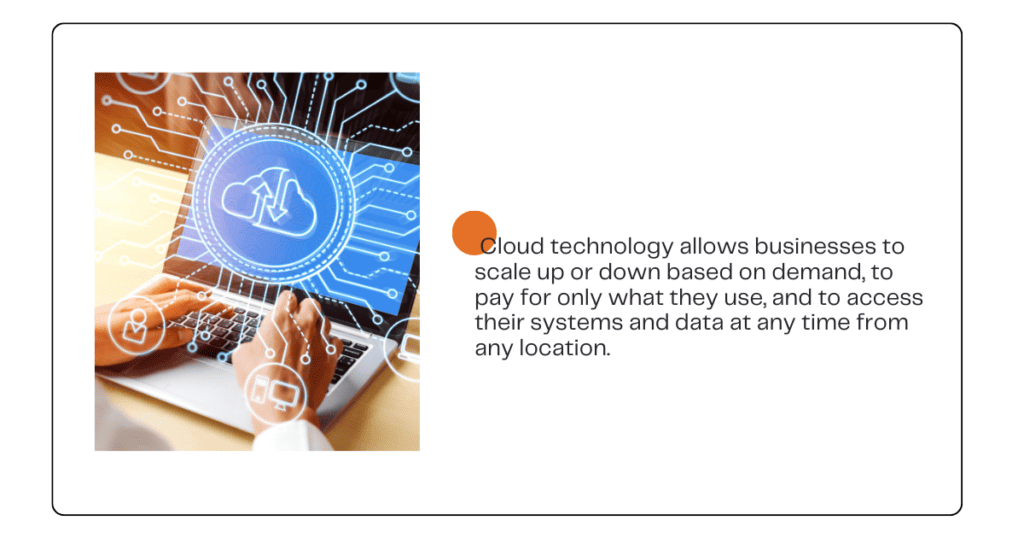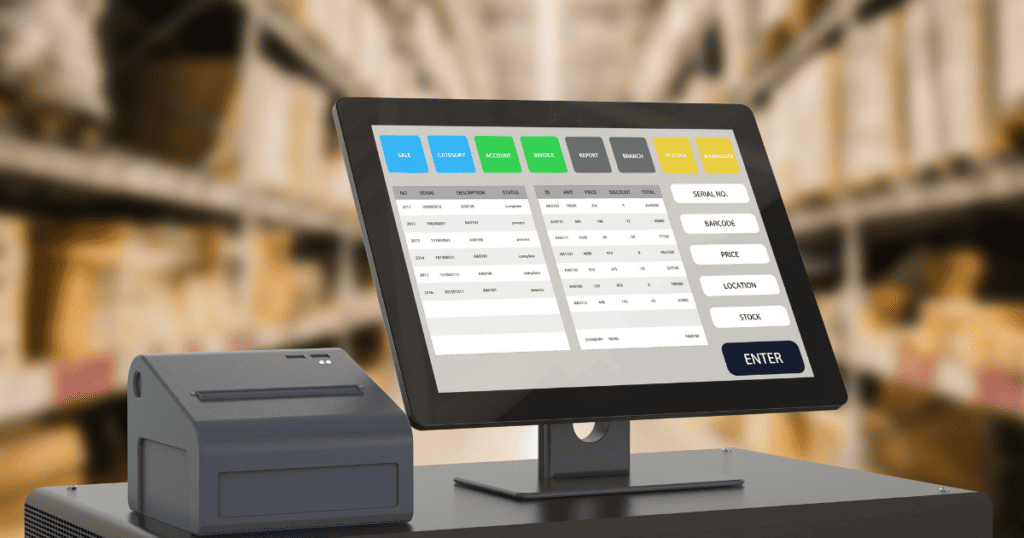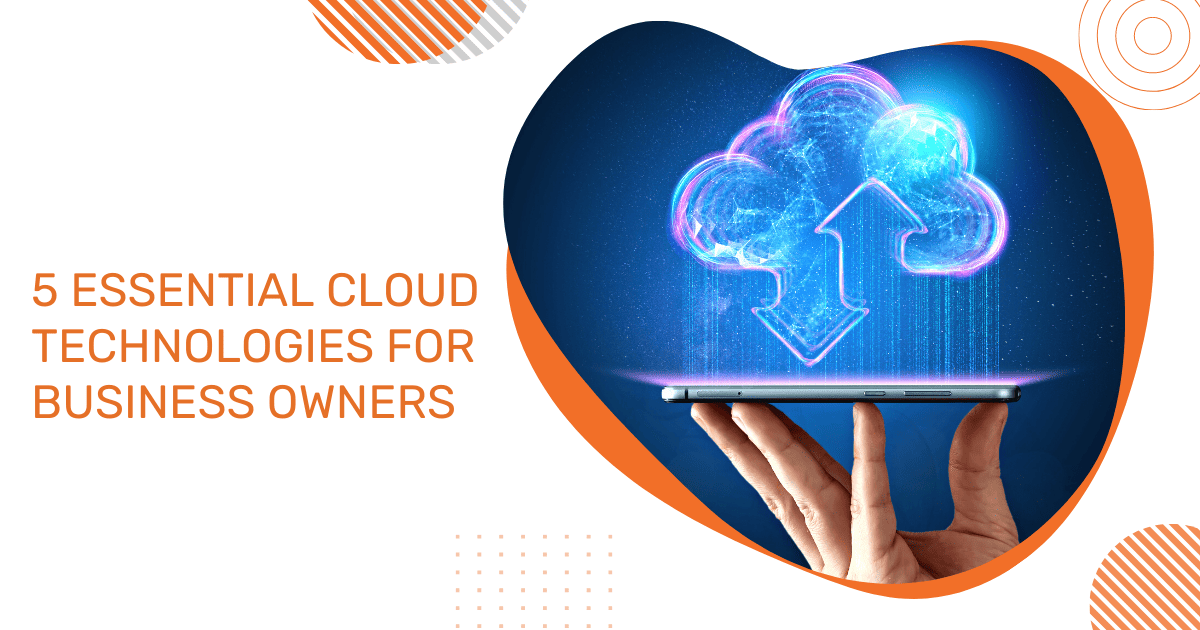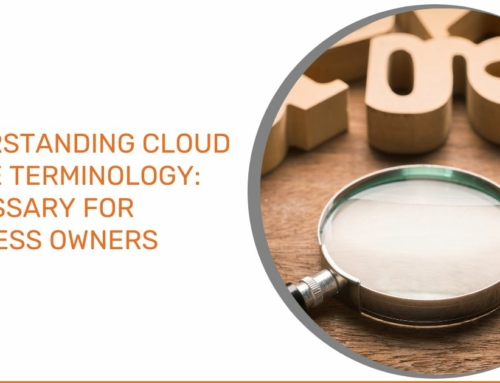In the digital transformation era, cloud technologies have emerged as indispensable tools for optimizing operations, boosting efficiency, and driving growth. In this article, we explain cloud technology and then share five specific cloud technologies that business owners should consider integrating into their operations. Let’s get started!
Introduction to Cloud Technologies

Cloud technologies form the backbone of modern digital transformation for businesses of all sizes. But what exactly do we mean by ‘cloud technologies’? Essentially, the cloud refers to servers accessed over the internet (and the software and databases running on those servers). By using applications on the cloud, you are not tied down to a physical location; you can access your data and applications from anywhere, at any time, without having to manage the underlying infrastructure.
One of the primary reasons businesses are migrating to cloud technology is the flexibility it offers. Cloud technology allows companies to scale up or down based on demand, to pay for only what they use, and to access their systems and data at any time from any location. Moreover, cloud technologies often have enhanced security and disaster recovery capabilities, which are increasingly important in today’s cyber threat landscape.
Adopting cloud technologies can unlock new levels of innovation and productivity for businesses. In many cases, cloud services come with cutting-edge features that would be challenging and costly to implement in-house. For instance, advanced analytics, machine learning capabilities, and collaborative tools can provide deeper insights into business operations, improve decision-making, and enhance teamwork. These aspects, coupled with the ability to integrate with other digital platforms and tools, make cloud technologies an investment in operational efficiency and strategic growth. As such, cloud technology is becoming an integral part of business models across industries, helping businesses to stay agile and adapt quickly to changing market conditions.
5 Essential Cloud Technologies for Business Owners

There are many cloud technologies available, so where do you start? We’ve picked out five standout cloud technologies that every business owner should have on their radar. These gems have shown their worth by helping businesses streamline operations, improve customer interactions, and foster lasting success. Let’s dive in and discover how they can do the same for your business.
1. Cloud-Based Phone Systems
Traditional on-premises phone systems are gradually being replaced by cloud-based phone systems, also known as Voice over Internet Protocol (VoIP) systems. These systems use the internet to transmit voice calls, offering greater flexibility, cost-effectiveness, and advanced features.
Take, for example, a bustling pizzeria. Unlike traditional phone systems that limit the number of lines, cloud-based phone systems (like PizzaPhones® by Clarity Voice) offer unlimited lines. With more lines available, you can take extra calls, serve more customers, and boost sales.
But it doesn’t stop there. Cloud phone systems also offer features like:
- 4G LTE Failover: To protect your critical sales technology in case of an internet outage.
- On-Hold Upsell Messages: To create professional greetings that promote menu items and increase the average ticket.
- Call Recordings: To ensure your team is following procedures and delivering consistent service.
- Call Analytics: To help you understand data on answer times, hold times, missed calls, and more so you can fix problems and find opportunities.
With so many features to explore, it’s easy to see why many businesses are migrating to a cloud phone system.
2. Point-of-Sale (POS) Systems

Cloud-based POS systems have revolutionized the way businesses handle sales transactions and manage their inventory. These systems enable companies to process payments, track sales, and monitor inventory levels in real time.
Take, for example, a plumbing service provider. A cloud-based POS system could streamline their billing process, automatically track the parts used for each job, and sync with the inventory to maintain accurate stock levels. This real-time synchronization across multiple operations improves efficiency and significantly reduces the likelihood of errors.
3. Customer Relationship Management (CRM) Solutions
CRM solutions assist businesses in managing and nurturing their customer relationships. Cloud-based CRM platforms provide a centralized database accessible from anywhere, enabling business owners and their teams to access customer information, track interactions, and manage sales pipelines.
Consider an auto dealership. With a cloud-based CRM or DMS, all interactions with a customer, whether through email, phone calls, or in-person visits, can be tracked. This allows sales teams to better understand the customer’s preferences and needs and provide more tailored service. The CRM can also facilitate follow-ups, schedule maintenance reminders, and even assist in targeted marketing efforts, making the sales process more efficient and effective.
4. Collaboration and Communication Tools

Cloud-based collaboration and communication tools have become indispensable for businesses with remote or distributed teams. These tools enable seamless communication, file sharing, and project management across different locations and time zones.
Cloud-based collaboration and communication tools can significantly improve productivity for a distributed or remote team working on a project. They provide a common platform for real-time collaboration, streamline workflows, and reduce the chance of miscommunication. Cloud-based collaboration platforms allow team members to share files, discuss ideas, assign tasks, and track project progress all in one place, regardless of location. This leads to faster decision-making, improved teamwork, and, ultimately, better outcomes for the project.
5. Data Backup and Recovery Solutions
Data is one of the most valuable assets for any business, so losing it is potentially catastrophic. This is where cloud-based backup and recovery solutions come in. They automatically and securely store data off-site, protecting it from hardware failures, natural disasters, or cyber threats.
Consider a financial services company as an example. These organizations deal with massive amounts of sensitive data, including personal client information and transaction histories. Any data loss, be it from a system failure or a security breach, can have severe consequences, including reputational damage and non-compliance penalties. Cloud backup solutions offer a secure environment for storing data and ensure a quick recovery in case of mishaps. This reduces downtime, allows for business continuity, and provides peace of mind knowing that data is safely backed up.
Explore the Cloud!

Embracing cloud technology isn’t just an option anymore; it’s necessary for businesses seeking to maintain a competitive edge in today’s rapidly evolving digital landscape. From cloud-based phone systems like Clarity Voice to POS, CRM, collaboration tools, and data backup services, these technologies enable businesses to streamline processes, cut costs, and deliver exceptional customer experiences.
By carefully evaluating your business needs, you can select the cloud technologies that align with your objectives and contribute to your long-term growth. Remember, the cloud isn’t about changing your business model; it’s about making it more efficient and adaptable to future advancements.
As we move toward a digital-first world, understanding and utilizing these cloud technologies will be crucial to your business’s success story. Don’t shy away from exploring the potential of the cloud. Instead, let it rain opportunities for your business!



